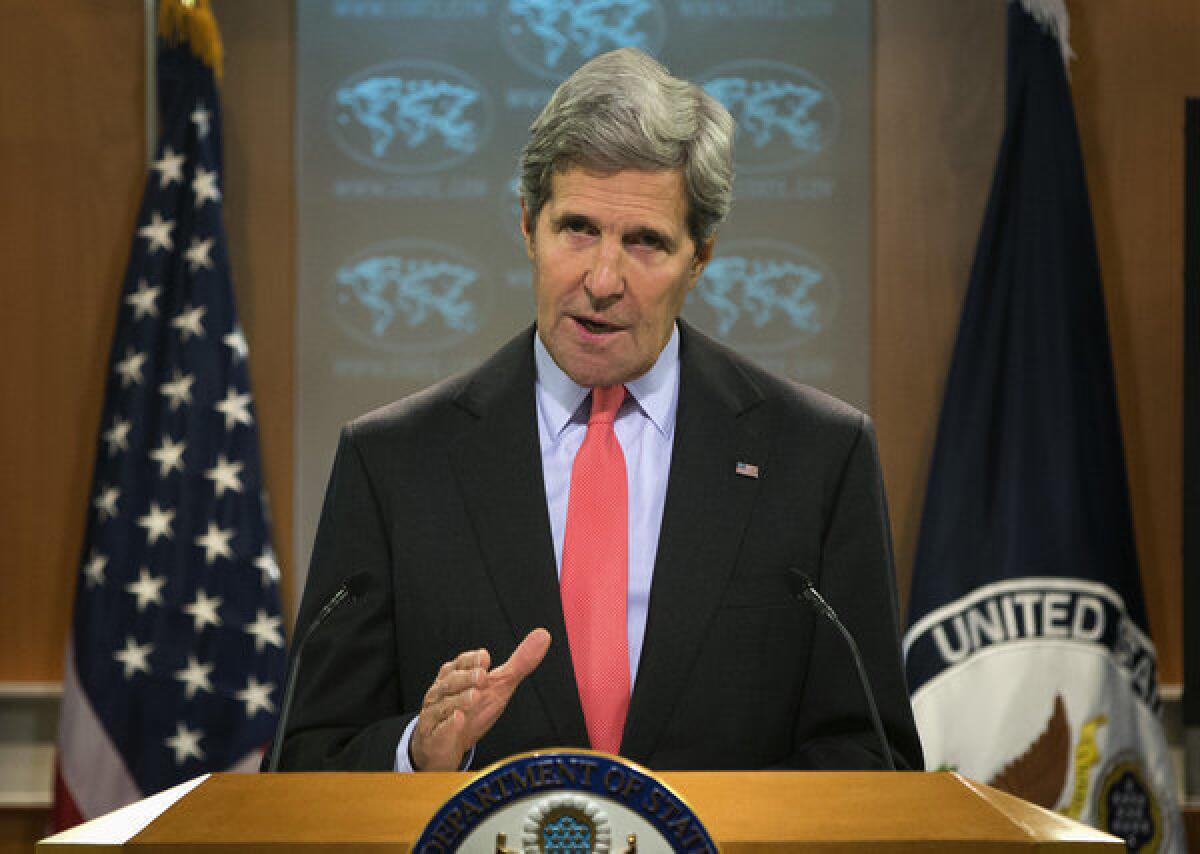Mounting pressure on White House to sanction Egyptian military

WASHINGTON -- The Obama administration faces mounting pressure to sanction the Egyptian military for its violent crackdown on opponents, even though officials refrained from any punitive action Wednesday.
As the Egyptian government declared emergency law and its security forces killed dozens of Islamist protesters, U.S. officials condemned the actions and said they were weighing whether to call off a large-scale joint military exercise or cut $1.5 billion in aid.
Secretary of State John F. Kerry, in a brief appearance Wednesday afternoon at the State Department, said the violence was “deplorable” and stressed the administration’s opposition to the imposition of emergency law.
But the administration also made clear it was deeply reluctant to move too forcefully against the military government that took power last month, fearing that such an action could jeopardize U.S. security interests in the region and diminish what limited leverage Washington has.
U.S. officials have been trying to avoid taking sides with either the military or the elected Islamist government that was ousted last month, as the Obama administration has sought to avoid perceptions that it is interfering in Egyptian politics for its own ends.
“This is complicated — it’s not black and white,” Jen Psaki, a State Department spokeswoman, told reporters.
But the escalating violence, and other signs that the military is not planning a restoration of democracy, are sure to bring pressure for the administration to distance itself from the generals, said U.S. officials and private analysts.
Daniel Kurtzer, a former U.S. ambassador to Egypt, said that only a few weeks ago, calls for cutting off U.S. aid were limited on Capitol Hill and the administration was “in a pretty comfortable position” in its desire to continue the flow of assistance.
But if the military sticks to its current course, “the pressure’s going to grow, making it very hard for the administration to continue as it has been,” said Kurtzer, who is now with the Woodrow Wilson School at Princeton University.
“We’re close to a turning point where people around here aren’t going to want to be close to a government that behaves like this,” said a Senate aide who declined to be identified because he was not authorized to speak on the record. “They’re going to want to push back some.”
It will be uncomfortable for the United States to halt the $1.3 billion in annual military aid, partly because the military financing system would badly hurt military contractors, Kurtzer said.
But there are other steps that the administration could take, starting with the cancellation of the Bright Star military exercise with Egypt next month, which aims to demonstrate the countries’ joint capabilities for dealing with security threats in the region. Officials said a cancellation was under discussion, though no decision had been made.
“That would be a big step,” said Amy Hawthorne, a former State Department Mideast specialist who is now with the Atlantic Council. “It’s important to the military.”
U.S. officials, along with their Western European counterparts, have spent long days in Cairo recently to try to persuade the military not to embark on a crackdown that would drive the Islamist opposition underground and threaten more violent conflict.
Hawthorne argued that the government’s reaction to the administration’s approach demonstrates that Washington needs to move more forcefully.
Though administration officials have argued that the United States will preserve influence by maintaining its relationship, “where is that influence?” Hawthorne said. “You can see from the way things have unfolded it’s not there. They’ve basically thumbed their noses at us at every turn.”
The crackdown brought renewed calls for the United States to halt aid, including from Sen. John McCain (R-Ariz.) and Freedom House, a U.S.-funded human rights advocacy group.
The administration should cut aid immediately to show “that there are consequences for the Egyptian military’s unbridled violence against its own people,” said Daniel Calingaert, executive vice president of Freedom House.
ALSO:
Israelis, Palestinians resume peace talks amid secrecy
Europe shows signs of economic recovery amid grown in Eurozone
Violence spreads across Egypt after crackdown on Morsi supporters
paul.richter@latimes.com
More to Read
Start your day right
Sign up for Essential California for news, features and recommendations from the L.A. Times and beyond in your inbox six days a week.
You may occasionally receive promotional content from the Los Angeles Times.







